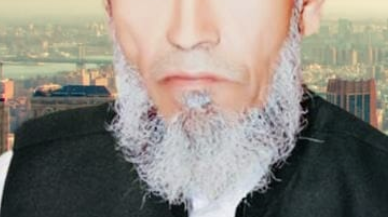Islamic Beards!
- brewtoch
- May 7, 2022
- 3 min read
Last week I posted an article about the headscarves and head coverings worn by Muslim women. This week, I thought I should give equal treatment to men, so the topic this week is beards. I cover this in my forthcoming book, Muslim Mechanics, but this article probably has more depth to it.
First, photo credit for the bearded Chechen military commander goes to bitchute.com, a video photojournalist website covering the Ukrainian War from the Russian Federation's point of view. The Chechens are a Muslim branch of the Russian forces, and this particular picture was a screengrab taken during the siege of Mariupol. Notice the beard is 4 to 5 inches under the chin. The mustache is shaved off. There were numerous videos of Chechen activity, and virtually all troops had beards like this commander. A few men, mostly young soldiers, did not have a full beard, and it was my opinion that their young age impaired their ability to grow facial hair. As to the style, there is a reason why there is a full beard and no mustache.
There is no explicit mention of beards in the Qur'an. However, in the hadith, there is mention of Muhammad's beard and his thoughts about the beard. Most Islamic scholars (the Ulama) believe that it should also be mandatory for all Muslim men since the Prophet had a beard. In the Qur'an (3:31), it does suggest that "If you love Allah, then follow Muhammad." This implies that since Muhammad had a beard, all Muslim men should have one also.
Regarding the hadith, there is one worth mentioning. Al-Bukhari (Vol 7, Book 72, #781) quotes Muhammad saying, "Do the opposite of what the pagans do. Cut the mustache short and leave the beard (as it is). Sahih Muslim also lists a similar hadith. The leading case for beards is linked explicitly to set the Muslims apart and distinguish them based on clothing and outward appearance from polytheists, Jews, and Christians.
In the Arab and Muslim world, facial hair means far more than just style or grooming. It's a sociological signifier, a shorthand way of telling you who you are dealing with and what they're all about before they can even speak. Muslim Brotherhood members are Islamists, and they prefer the full beard and mustache, well-groomed, of course. The Salafists, the ultraconservative fundamentalist Muslims, let their beards grow long and wild, often leaving their upper lip clean-shaven similar to how they think Muhammad wore his beard. Believe it or not, some Salafists temporarily dye their beards in colors ranging from maroon to orange. For the most part, the colors are individual preferences. Followers of Shia Islam generally prefer closely cropped beards, which are mainly three to five days of growth.
It is usually the radical jihadists that make beards mandatory. In the terrorist organization known as the Islamic State, beards are required. ISIS even added a prohibition on mocking the beard, using the Qur'an (9:65-66) to justify their rationale. The Taliban at one time required beards, as did the Hizbul-Islam militants in Somalia.
The growing of beards has been linked with piety and manhood for thousands of years. Numerous stone carvings from the Egyptians to the Sumerians show great leaders with beards. In Judaism and Christianity, the ancient priests often used to grow beards, and their shaving was seen as a sign of shame and dishonor (1 Chronicles 19:4-5). In some Muslim countries, it is also seen as a sin. For those Muslims with full beards, it is usually acceptable to trim the beard to the length of a fist under the chin.
In 2014, the U.S. military released a new policy outlining how religious service members might apply for a waiver to wear a beard to express religious views. The Australian Defence Force did the same. It is interesting to note that religious scholars acknowledge that there may be safety or operational risks associated with the beard. Under those circumstances, it is acceptable to trim or remove the beard until the situation changes.

I close the blog with a picture of a Sunni imam from Pakistan and a Shia cleric from Iran. Photo credit goes to Wikipedia Commons. Both men are wearing beards common to their religion and country.

コメント